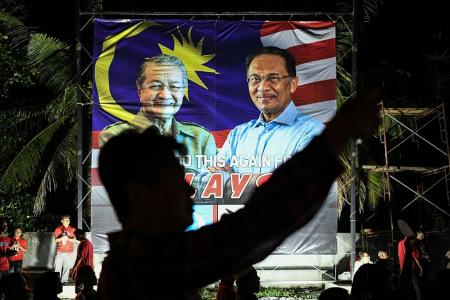Identity politics at heart of M’sia election
How secular issues square up against racial-religious ones will shape landscape
Malaysia's 14th General Election next month will reveal how identity politics is refashioning the electoral landscape of one of South-east Asia's economically most successful nations.
A visceral array of ethnic forces has shaped up around the confrontation between the ruling Barisan Nasional (BN) coalition and the opposition.
This deployment of forces is represented primarily by Prime Minister Najib Razak; veteran opposition leader Anwar Ibrahim; and former premier Mahathir Mohamad.
Mr Anwar has joined forces with Dr Mahathir, who ousted him once from the deputy premiership, to take on Mr Najib.
Behind these figures and others waiting in the wings is a coming settling of political scores among three forces.
The first is an avowed national compact that has been built up since the country's independence in 1957 - one based on the concept of ethnic Malay supremacy in politics and which includes safeguarding the economic interests of rural Malays, and yet is multiracial in demographic scope.
That compact is represented by BN - its leading member is Umno - but supported by the Malaysian Chinese Association and Malaysian Indian Congress.
Then, there is an alignment of ethnic Chinese and liberal, largely urban, Malay and Indian interests embodied in the secular opposition alliance, the Pakatan Harapan (PH). It draws strength from the nominally multiracial but heavily Chinese Democratic Action Party.
Then there is the religious agenda of the opposition Parti Islam SeMalaysia (PAS), which is bent on turning Malaysia into an Islamic state replete with religious syariah laws that include criminal hudud penalties.
Thus, BN's Malay-based but inclusive ethnic nationalism will be tested by the two alternative choices: PH's expansive and liberal redefinition of Malaysian ethnicity, and the strictly Islamic vision of PAS.
The results of the election will turn on how ethnic affiliations envision a Malaysia for all. No matter how much every side said it is on the side of democratic pluralism, this election will be about identity politics.
That is hardly surprising. Malaysia's political parties are essentially racial, but they come together in multiracial coalitions for the purpose of contesting for power.
This is unlike in Singapore, where all viable political parties are multiracial in composition and electoral appeal.
In Singapore, as in Malaysia, "race" is not a dirty word.
But in Malaysia, parties by and large represent racial and not pan-ethnic constituencies.
RACIAL IDENTITY
This election will show how the politics of racial identity square up against calls for change made by Malaysians - particularly young ones - concerned over economic issues such as official and corporate corruption and the rising cost of living.
Should racial-religious choices win over the secular issues, Malaysian polity could be expected to harden along ethnic lines. A good showing nationally by PAS, whose electoral appeal is limited now to the states of Kelantan and Terengganu, would suggest that Malaysia's Muslims are willing to emphasise the exclusivity of religious identity over what unites them with non-Muslim Malaysians.
Likewise, a strong showing for PH, based on a groundswell of Chinese support, would indicate the community sees its future as lying in a relatively combative relationship with the Malay-led establishment.
It is BN, tarred by corruption and the inevitable attrition of incumbency, that holds out a cruel choice for Malaysians: Prefer the known limitations of political continuity, or take a chance on the unknown pitfalls of systemic change.
The results will be watched closely in neighbouring countries, particularly Indonesia.
There, the ethnic right is trying to make a comeback at two levels: At the bottom, there is Muslim street vigilantism; at the top, several retired military leaders, associated with the once staunchly secular army, are using Islam to make a political comeback.
Singapore has no choice but to deal with whoever is in power in Malaysia, on the basis of the sovereign equality of states.
A Mahathir administration would not be favourable to closer economic ties with the Republic, and any gains for PAS would cast a shadow on the secular basis of democracy that Singaporeans take for granted in their own country. But if that is to be Malaysia's future, Singapore will have to live with it.
The writer is chief executive of Pereira International, a Singapore-based political consultancy. This article appeared in The Business Times on Wednesday.
Get The New Paper on your phone with the free TNP app. Download from the Apple App Store or Google Play Store now



